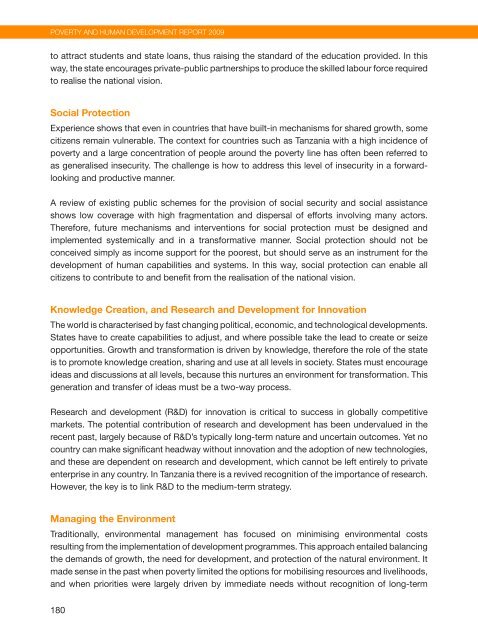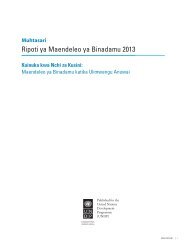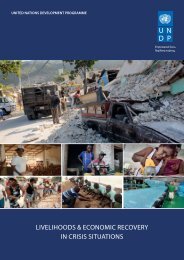Poverty and Human Development Report 2009 - UNDP in Tanzania
Poverty and Human Development Report 2009 - UNDP in Tanzania
Poverty and Human Development Report 2009 - UNDP in Tanzania
You also want an ePaper? Increase the reach of your titles
YUMPU automatically turns print PDFs into web optimized ePapers that Google loves.
pOVertY aND hUMaN DeVeLOpMeNt repOrt <strong>2009</strong><br />
to attract students <strong>and</strong> state loans, thus rais<strong>in</strong>g the st<strong>and</strong>ard of the education provided. In this<br />
way, the state encourages private-public partnerships to produce the skilled labour force required<br />
to realise the national vision.<br />
Social Protection<br />
Experience shows that even <strong>in</strong> countries that have built-<strong>in</strong> mechanisms for shared growth, some<br />
citizens rema<strong>in</strong> vulnerable. The context for countries such as <strong>Tanzania</strong> with a high <strong>in</strong>cidence of<br />
poverty <strong>and</strong> a large concentration of people around the poverty l<strong>in</strong>e has often been referred to<br />
as generalised <strong>in</strong>security. The challenge is how to address this level of <strong>in</strong>security <strong>in</strong> a forwardlook<strong>in</strong>g<br />
<strong>and</strong> productive manner.<br />
A review of exist<strong>in</strong>g public schemes for the provision of social security <strong>and</strong> social assistance<br />
shows low coverage with high fragmentation <strong>and</strong> dispersal of efforts <strong>in</strong>volv<strong>in</strong>g many actors.<br />
Therefore, future mechanisms <strong>and</strong> <strong>in</strong>terventions for social protection must be designed <strong>and</strong><br />
implemented systemically <strong>and</strong> <strong>in</strong> a transformative manner. Social protection should not be<br />
conceived simply as <strong>in</strong>come support for the poorest, but should serve as an <strong>in</strong>strument for the<br />
development of human capabilities <strong>and</strong> systems. In this way, social protection can enable all<br />
citizens to contribute to <strong>and</strong> benefit from the realisation of the national vision.<br />
Knowledge Creation, <strong>and</strong> Research <strong>and</strong> <strong>Development</strong> for Innovation<br />
The world is characterised by fast chang<strong>in</strong>g political, economic, <strong>and</strong> technological developments.<br />
States have to create capabilities to adjust, <strong>and</strong> where possible take the lead to create or seize<br />
opportunities. Growth <strong>and</strong> transformation is driven by knowledge, therefore the role of the state<br />
is to promote knowledge creation, shar<strong>in</strong>g <strong>and</strong> use at all levels <strong>in</strong> society. States must encourage<br />
ideas <strong>and</strong> discussions at all levels, because this nurtures an environment for transformation. This<br />
generation <strong>and</strong> transfer of ideas must be a two-way process.<br />
Research <strong>and</strong> development (R&D) for <strong>in</strong>novation is critical to success <strong>in</strong> globally competitive<br />
markets. The potential contribution of research <strong>and</strong> development has been undervalued <strong>in</strong> the<br />
recent past, largely because of R&D’s typically long-term nature <strong>and</strong> uncerta<strong>in</strong> outcomes. Yet no<br />
country can make significant headway without <strong>in</strong>novation <strong>and</strong> the adoption of new technologies,<br />
<strong>and</strong> these are dependent on research <strong>and</strong> development, which cannot be left entirely to private<br />
enterprise <strong>in</strong> any country. In <strong>Tanzania</strong> there is a revived recognition of the importance of research.<br />
However, the key is to l<strong>in</strong>k R&D to the medium-term strategy.<br />
Manag<strong>in</strong>g the Environment<br />
Traditionally, environmental management has focused on m<strong>in</strong>imis<strong>in</strong>g environmental costs<br />
result<strong>in</strong>g from the implementation of development programmes. This approach entailed balanc<strong>in</strong>g<br />
the dem<strong>and</strong>s of growth, the need for development, <strong>and</strong> protection of the natural environment. It<br />
made sense <strong>in</strong> the past when poverty limited the options for mobilis<strong>in</strong>g resources <strong>and</strong> livelihoods,<br />
<strong>and</strong> when priorities were largely driven by immediate needs without recognition of long-term<br />
180





